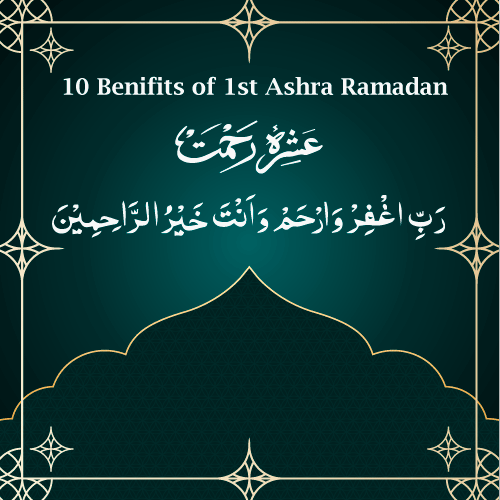
10 Benefits of the First Ashra of Ramadan
Introduction:
As the blessed month of Ramadan approaches, Muslims around the world eagerly anticipate the opportunity to partake in a period of spiritual rejuvenation, reflection, and devotion. Ramadan is divided into three Ashras, each offering unique opportunities for spiritual growth and connection with the Divine. We delve into the significance of the first Ashra of Ramadan and explore the ten profound benefits it brings to believers.
The first Ashra of Ramadan is a sacred period filled with divine blessings and opportunities for spiritual growth. During these ten days, believers embark on a journey of self-discovery and devotion, seeking forgiveness and mercy, strengthening faith, and spreading charity. May we all utilize this auspicious time to draw closer to Allah and reap the countless blessings He has bestowed upon us during this blessed month.

1) Mercy (Rahmah): 10 Benefits of the First Ashra of Ramadan
- Mercy (Rahmah): The first Ashra of Ramadan is a time when the mercy of Allah (SWT) envelops His servants. It is a period of immense compassion and forgiveness, where believers are encouraged to seek repentance and draw closer to their Creator. In Islamic tradition, the concept of mercy, known as “Rahmah,” occupies a central place in the hearts of believers. Derived from the Arabic root word “Rahim,” which means womb, Rahmah encompasses compassion, kindness, and forgiveness. It reflects the nurturing and protective love that a mother extends to her child, transcending boundaries and embracing all of creation. The Quran describes Allah as “the Most Merciful, the Most Compassionate,” emphasizing his boundless capacity for forgiveness and grace. This divine mercy is believed to be inherent in the very nature of Allah, encompassing all beings, regardless of their faith or actions. Muslims are encouraged to seek Allah’s mercy through acts of worship, repentance, and charity, understanding that it is through His mercy that they find guidance, solace, and salvation. Furthermore, believers are called upon to embody mercy in their interactions with others, following the example of Prophet Muhammad, peace be upon him, who is described as a mercy to all the world—10 Benefits of the First Ashra of Ramadan.
2) Forgiveness (Maghfirah)
Forgiveness (Maghfirah) is a profound concept deeply rooted in Islamic teachings. It embodies mercy, compassion, and reconciliation. In the Islamic tradition, forgiveness is not merely a gesture of pardoning transgressions; it’s also an act of spiritual purification and elevation.
The Quran frequently emphasizes the importance of forgiveness, portraying it as a virtuous quality that leads to inner peace and harmony. Muslims are encouraged to forgive others as a means of attaining closeness to Allah and fostering goodwill amongst fellow human beings. The act of forgiving is seen as a manifestation of strength rather than weakness, as it requires overcoming ego and pride. Moreover, forgiveness holds the power to heal wounds, mend broken relationships, and cultivate a culture of empathy and understanding through the 10 Benefits of the First Ashra of Ramadan.

3) Salvation from Hellfire (Najat)
Salvation from the torment of hellfire, known as Najat, is a fundamental concept in Islamic theology. It signifies deliverance from the eternal punishment that awaits those who disobey God’s commands. Muslims believe that through sincere repentance, good deeds, and submission to the will of Allah, one can attain Najat and secure a place in paradise. This concept serves as a source of hope and motivation for believers to lead righteous lives and seek forgiveness for their sins. It emphasizes the importance of faith, righteous actions, and adherence to the teachings of Islam as the path to eternal salvation and bliss with the help of Benefits of the First Ashra of Ramadan.
4) Guidance (Hadayah)
Guidance, known as Hidayah in Arabic, is a fundamental concept in Islam, encompassing the divine direction and enlightenment provided by Allah to His followers. It serves as a roadmap for leading a righteous and fulfilling life according to Islamic principles. The Quran, the holy book of Islam, and the teachings of Prophet Muhammad (peace be upon him) are considered the primary sources of guidance for Muslims. Seeking Hidayah involves:
- Striving for spiritual growth.
- Understanding one’s purpose.
- Adhering to moral values such as compassion, honesty, and justice.
Through prayer, reflection, and adherence to Islamic teachings, believers aim to attain Allah’s guidance in navigating life’s challenges and decisions.
5) Protection from Trial and Tribulations (Afiyah)
Afiyah, a term encompassing protection from trial and tribulations, is deeply rooted in Islamic teachings, offering solace and resilience amidst life’s challenges. It embodies a state of holistic well-being, encompassing physical, mental, and spiritual health. Muslims seek Afiyah through prayer, seeking refuge in the Almighty’s mercy during times of adversity. It fosters an attitude of gratitude and trust in divine wisdom, guiding believers to navigate through trials with patience and perseverance. Afiyah is not merely the absence of hardship but the presence of inner peace, resilience, and steadfastness, ensuring individuals emerge stronger from life’s tests.
6) Blessing (Barakah)
Barakah, or blessing, is a profound concept deeply rooted in Islamic tradition. It represents divine grace and abundance bestowed upon individuals, families, and communities. It’s believed that with barakah, even the simplest of provisions can be sufficient, and hardships can be eased. This blessing encompasses various aspects of life, including health, wealth, relationships, and time. Seeking barakah involves fostering gratitude, humility, and mindfulness of one’s actions. It’s a reminder that true prosperity is not merely material wealth but also spiritual enrichment and contentment. May we all be blessed with barakah in our lives, guiding us toward goodness and fulfillment by the 10 Benefits of the First Ashra of Ramadan.
7) Increased Taqwa (God-consciousness)
Increased Taqwa, or God-consciousness, is a transformative state of heightened awareness and reverence towards Allah. It encompasses a deep sense of mindfulness in all actions, thoughts, and intentions, aligning them with the teachings of Islam. As one’s Taqwa strengthens, it becomes a guiding light, illuminating the path toward righteousness and away from sin. This heightened consciousness fosters a profound connection with the Divine, leading to a life of greater purpose, integrity, and spiritual fulfillment. Through sincere devotion, reflection, and adherence to Islamic principles, individuals can cultivate and nurture their Taqwa, enriching their lives with divine grace and blessings—10 Benefits of the First Ashra of Ramadan.
8) Strengthening of Faith (Iman)
Strengthening of faith, or Iman, is a journey of profound spiritual growth and connection for individuals. It involves nurturing one’s belief in the unseen, deepening trust in the Divine, and aligning actions with values rooted in faith. This strengthening occurs through various practices such as prayer, reflection on scripture, acts of charity, and seeking knowledge. It entails cultivating resilience amidst life’s challenges and finding solace in the understanding of divine wisdom. Moreover, engaging in a supportive community and surrounding oneself with positive influences contribute significantly to the reinforcement of faith. Ultimately, the process of strengthening Iman is dynamic, requiring continual effort and sincerity in pursuit of spiritual enlightenment and closeness to the Divine.
9). Increased Acts of charity (Sadaqah)
In recent times, there has been a noticeable surge in acts of charity, particularly Sadaqah, within communities across the nation. This upsurge reflects a commendable shift towards compassion and solidarity. Individuals from all walks of life are demonstrating an increased sense of empathy and responsibility towards those less fortunate. Whether it’s through monetary donations, volunteering efforts, or providing essential resources, people are actively engaging in acts of kindness to alleviate the hardships faced by others. This resurgence of generosity not only fosters a stronger sense of community but also signifies a collective commitment to addressing societal challenges and fostering a culture of care and support.
10) Elevation of status (Darajat)
Elevation of status, or Darajat, is a concept deeply ingrained in various cultures and societies, representing the attainment of a higher position or rank. It transcends mere social recognition, embodying a culmination of achievements, virtues, and respect. Within this paradigm, individuals ascend through merit, demonstrating excellence in their chosen fields or embodying noble qualities. This elevation isn’t solely about personal gain but also about contributing positively to the collective community. It symbolizes a journey of growth, character development, and societal impact. Thus, Darajat serves as a beacon, inspiring individuals to strive for excellence while fostering a culture of honor and respect.



